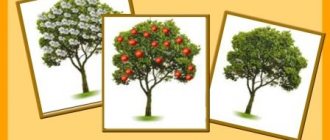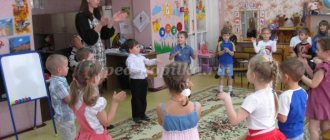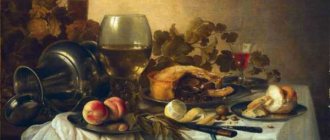MUNICIPAL BUDGETARY PRESCHOOL EDUCATIONAL INSTITUTION "KINDERGARTEN "KOLOBOK" S. PEROVO, SIMFEROPOL DISTRICT, REPUBLIC OF CRIMEA
Summary of educational activities for speech development in a preparatory speech therapy group. Topic: “Garden. Fruits".
Konatyeva E.V. Teacher, MBDOU "Kindergarten "Kolobok" p. Perovo" Simferopol district
2017
Objectives: 1. Summarize and systematize children’s knowledge about autumn, about the changes occurring in nature, activate the vocabulary on the topics: “Autumn”, “Vegetables”, “Fruits”. 2. Contribute to the development of integrative personality qualities (Curious, active; emotionally responsive, etc.) 3. Develop the grammatical structure of speech: use words in speech - signs, words with opposite meanings, learn to form adjectives from nouns, learn to coordinate nouns with numerals. 4. Develop auditory attention, speech and music hearing, motor coordination. 5. Learn to answer questions with complete and short answers. 6. Form ideas about native nature, cultivate love for the native land and nature. 7. Develop skills of cooperation, mutual understanding, goodwill, and initiative. Materials. Equipment. 1. Excerpts of musical works for listening: A. Vivaldi “Autumn”, P. I. Tchaikovsky “Autumn Song”. 5. Subject pictures depicting vegetables, fruits, autumn landscape. GCD move; Educator: Today we received a letter in kindergarten. To find out who this letter is from, guess the riddle! “I bring the harvests, I sow the fields again, I send the birds to the south, I strip the trees. But I don’t touch pines and fir trees...” Can you guess who it is? That's right, Autumn. (The letter was sent by Autumn) Let's read the letter. "Dear Guys! More than anything else in the world, today I want to invite you to the autumn forest. Come urgently, a thousand miracles await you!” Autumn. Educator: Well, children, shall we accept Autumn’s invitation? Shall we go to the autumn meadow? Let's gallop like horses, and the tongue will help us. “On the horse along the road we gallop tsk-tsk-tsk (click the tongue) And with the horse’s hooves tsk-tsk-tsk (click the tongue) We slowly went up the hill and-and-and (pronounced) We rushed down the hill with the wind isss... (pronounced) And the horses set off at a gallop (to the music, moving around the hall at a straight gallop). We stopped on time!” (pronounce trrr-lips). Speech game. We walk along the forest path. “We will go along the forest path into a fairy tale and quickly find the way to autumn. (walking) Birch branches (swinging their arms) rustling affectionately (rubbing palm against palm) Forest of miracles and fairy tales Welcome the guys!” (bow) Educator: So you and I ended up in a forest clearing. (Breathing exercise). Goal: activation of vocabulary on the topics: “Vegetables”, “Fruits”, differentiation of vegetables and fruits. The children come to their chairs. First, those children who have vegetables in their pictures will sit down, then those children who have fruits in their pictures. Didactic game “My, mine, mine” Goal: activation of vocabulary on the topics: “Vegetables”, “Fruits”, development of auditory attention, improvement of the grammatical structure of speech, formation of possessive pronouns. Guys, look carefully at your pictures, bring up the pictures that you can say mine (my orange), now bring up the pictures that you can say mine (my beets), and finally, the pictures that you can say mine and my tomatoes) Great! Well done! Didactic game “Guess the riddle” Goal: expansion and activation of vocabulary on the topics: “Vegetables”, “Fruits”, development of auditory attention, logical thinking. Children, autumn has prepared riddles for you. Do you like to guess them? The gingerbread man hangs all summer long. This delicious yellow fruit is among the green branches. It is floating towards us from Africa, It will hit the ground with a loud sound, To the monkeys in the zoo When autumn comes. Provides food all year round. (Apple) (Banana) He is from the pumpkin family, This sissy is from the south, He lies on his side all day, Delicious and fresh. Like a green log of wood (Apricot) Under the name... (zucchini) Pictures with clues are displayed. Well done! You solved the riddles easily. Didactic game “The fourth odd one” Goal: to activate vocabulary on the topics “Vegetables”, “Fruits”. Development of logical thinking, auditory attention. Look and name which picture does not fit, explain your answer. Apple, banana, apricot, zucchini Exercise “strong wind” Goal: development of a directed air stream. (The sound of the wind is heard in the recording) Imagine that we have turned into a strong autumn wind. The wind has rushed into the garden and is shaking the leaves on the branches. Inhale through your nose. Hold your breath and blow on the leaves, stretching your lips out like a tube. Do not raise your shoulders as you inhale. Do not puff out your cheeks as you exhale.
Didactic game “Questions to fill” Goal: development of auditory attention, logical thinking. Listen and answer the questions, explain your answer. What are more in the garden - apples or apple trees? Physical exercise. Outdoor game “Apple Tree” Purpose: coordination of speech with movement; work on general speech skills (questioning intonation); development of fine motor skills. - Apple tree! Apple tree! Children walk in a circle, holding hands. Where are your apples? In the center there is one child - an “apple tree”. Did the frost freeze them? The children stop at each one Or did the wind carry them away? the line is bent one finger at a time Or did lightning burn it? . Or were they hit by hail? Or did the birds peck? Where did they go? They lower their hands and shrug their shoulders. - The frost did not freeze them, These words are uttered by a child - “apple tree” And the wind did not carry them away, Children bend one finger at a time, They were not burned by fire, starting with the big ones. There was no hail and rain, The birds did not peck them... The children tore them off! Children run away, the “apple tree” tries to catch them Consolidation of new material Didactic game: “Describe a fruit or vegetable according to plan” Goal: development of coherent speech, expansion of vocabulary. Today we are finishing the story about vegetables and fruits. Let's try to write stories about them. The diagram will help you. First, you will name a vegetable or fruit, describe what it looks like, feels like, tastes like, where it grows and what can be prepared from it. Listen to what I say and also tell me: An apple is a fruit, it is red in color, round in shape, small in size, sweet, grows on a tree in the garden. You can eat an apple raw, make juice, compote, jam from it, or bake an apple pie. Didactic game “Name the juices” (with a ball on the carpet) Goal: improving the grammatical structure of speech, forming relative adjectives using the suffix -ov. Children, let's remember what juices from different vegetables and fruits are called. I throw you a ball and name a fruit or vegetable, and you say what juice it makes and throw the ball to me. For example: from lemon - lemon. from an orange - ..., from a carrot - ..., from an apple - ..., from a cucumber - ..., from garlic - ..., from a tomato - ... . Well done, you did a great job. Autumn has prepared a gift for you - tasty and healthy juice, you will drink it in a group. Summary of the GCD: Educator: Our lesson has come to an end. We did a good job with you. Everyone tried very hard. We worked actively. Completed all tasks. And there were a lot of tasks. Let's remember what we did today. And I will help you (we guessed riddles, played ball). What did you like and remember most about the lesson?
Summary of speech therapy lesson “Fruits and vegetables”
Topic: Fruits and vegetables.
1. Correctional educational goals:
Develop and activate children's vocabulary on the topic: “Vegetables and fruits.” Improving the grammatical structure of speech - the use of relative adjectives.
2. Corrective and developmental goals:
Activation of children's speech activity. Improving dialogic speech, speech hearing, visual perception and attention. Development of articulatory and general motor skills. Development of dialogic speech, visual attention, thinking, articulatory, fine and gross motor skills, coordination of speech with movement.
3. Correctional and educational goals:
Formation of skills of cooperation, mutual understanding, goodwill, independence, initiative, responsibility. Fostering love and respect for nature.
Equipment: pictures of vegetables and fruits, a basket, dummies of vegetables and fruits, natural vegetables (whole and cut into pieces), a ball.
Progress of the lesson:
1. Organizational moment.
Today we are going on a journey. And we’ll go to our grandparents’ dacha to see what vegetables have ripened in the garden beds, what fruits have ripened.
"Let's try some vegetables".
The speech therapist gives the children two pictures of vegetables and asks: “What will you eat first, and what then?”
“First I will eat a tomato, and then a cucumber” (corn-eggplant, pepper-carrots, beets-radish, zucchini-cucumber, potato-pumpkin, cabbage-turnip).
2.
“Pick up a word.” Selection of homogeneous adjectives for nouns.
What cucumber? (Green, oval, hard, rough, watery, large, small, tasty.)
What kind of tomato? (Red, large, sour, sweet and sour, soft, juicy, smooth, ripe, ripe, unripe, beautiful), etc.
3. “Find out by description”: one child describes the vegetable, the others guess.
Round, juicy, healthy, soft (tomato). Oval, round, rough, green, hard (cucumber). Round, green, juicy, firm (cabbage). Triangular, orange, hard, crunchy, tasty (carrot).
(carrot). Round, hot, vitamin-packed, hard (onion). Round, burgundy, sweet, vitamin-rich (beets).
4. “Name the juice, salad.”
-use of relative adjectives.
Carrot juice - carrot, pea soup - pea, cabbage juice - cabbage, potato soup - potato, beet juice - beet, cucumber salad - cucumber, pumpkin juice - pumpkin, onion soup - onion.
5. “In the ground or on the ground.” Potatoes grow in the ground, and cabbage grows on the ground. Carrot-cucumber, eggplant-beets, tomato-radish, pumpkin-turnip, corn-radish).


